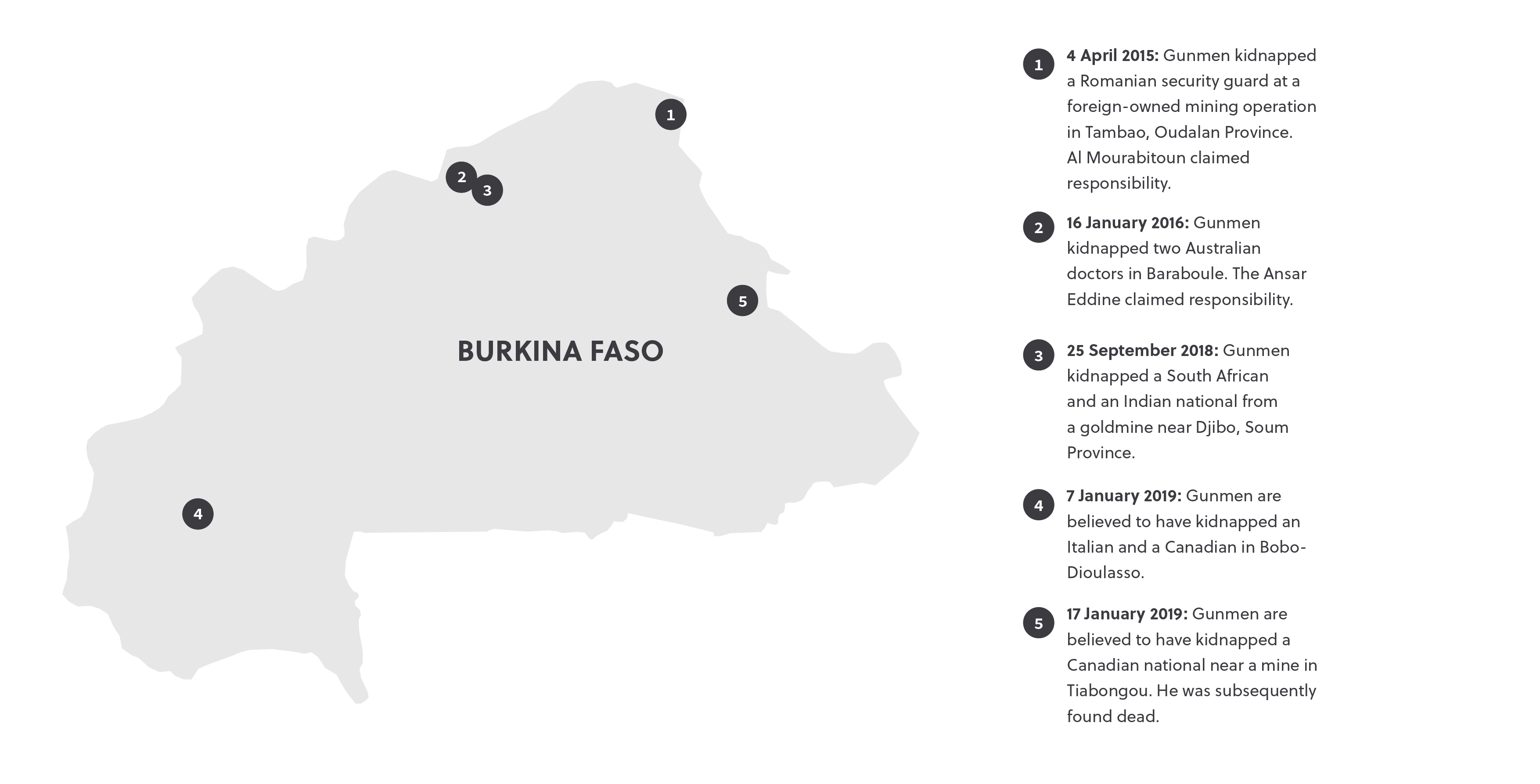Burkina Faso: A New Kidnapping Frontier
The January 2019 kidnapping and subsequent killing of Canadian geologist Kirk Woodman brought new and much needed attention to the rise of militant activity in Burkina Faso. While Islamist kidnappings targeting foreign nationals have declined globally in recent years, there have been five publicly reported militant-linked kidnappings involving foreign nationals in Burkina Faso since 2015. Two of the confirmed attacks have taken place in 2019 alone, and of the five confirmed cases, three involved expatriates working in the mining sector while the remaining two victims were foreign humanitarian workers.
Three organisations — the Mali-based Islamist group, Jama’a Nusrat ul-Islam wa Al Muslimin (JNIM), Islamic State’s regional representative, Islamic State in the Greater Sahel (ISGS) as well as JNIM’s local affiliate, Anasourl Islam — are all thought to have been involved in these attacks and in other kidnappings elsewhere in the wider Sahel. In fact, on 3 April, IS claimed responsibility for Woodman's kidnapping. These kidnappings have come amid a wave of terrorist attacks in Burkina Faso. Yet, in a country where Islamist militancy was barely on the radar prior to 2010, how did Burkina Faso become the latest frontier for Islamist militant kidnappings?
Regional Militancy on the Rise
Since the 2012 resurgence of a Tuareg rebellion and the parallel rise of an Islamist insurgency, there has been a power vacuum in northern Mali, resulting in insecurity and lawlessness. The March 2012 military coup further undermined the domestic authority of the Bamako-based administration, a legacy which continues to challenge the government of Malian President Ibrahim Boubacar Keïta.
Against this backdrop, Islamist militant groups have established operational strongholds in northern Mali and expanded their reach into neighbouring areas, including Burkina Faso, over the past five years. Among these are JNIM’s parent group, Al Qaeda in the Islamic Maghreb (AQIM), and notorious Al Mourabitoun. These groups and others ultimately merged in 2017 to form JNIM. True to its AQIM origins, JNIM has increasingly engaged in kidnapping attacks. Soon after its inception, in June 2017, JNIM released a video via its media outlet, Az Zallaqa, showing six foreign hostages captured by Al Qaeda groups between 2011 and 2017. Reports claim that JNIM and its affiliates have secured more than USD 40 million in ransom payments in recent years. These reports, coupled with AQIM’s May 2018 threat against Western companies operating in the Sahel, point to a clear intent to target foreign nationals in future.

Increased Insecurity in the Post-Compaoré Era
The October 2014 overthrow of Burkina Faso’s long-serving leader, Blaise Compaoré, ushered in a period of transition, and the subsequent democratic elections in November 2015 improved popular confidence in the ruling administration. However, the country also grew vulnerable to rising militancy.
Although not outwardly confirmed, it has been widely reported that Compaoré had secured deals with several domestic and regional armed groups between 2005 and 2012 to secure their neutrality, ultimately insulating Burkina Faso from regional terrorism threats. Among the reported dealmakers was JNIM leader Iyad Ag Ghaly. However, these arrangements became increasingly difficult to maintain following the outbreak of the Islamist insurgency in Mali in 2012 and, by late 2014, they had all but collapsed.
Border areas in the north have been left largely ungoverned and vulnerable to infiltration by regional militant groups.
In the interim, necessary security sector reform in the post-Compaoré era meant that security operations in the country were reprioritised. In the aftermath of the January 2016 mass casualty attacks against the Splendid Hotel in the heart of Ouagadougou, for example, authorities prioritised security in cities and major towns, leaving border areas in the north largely ungoverned and vulnerable to infiltration by regional militant groups. Furthermore, outside of urban centres, security forces have come to rely increasingly on poorly trained and ill-equipped vigilante groups, known as Koglweogo, who do not have the requisite capabilities to combat the rising insurgent threat.
The Role of Domestic Affiliates
Whereas JNIM is well rehearsed in kidnap-for-ransom, Burkina Faso’s grassroot organisation, Ansaroul Islam, will likely become increasingly active in this regard. Established in 2016, the group largely operates around Mondoro in Mali and Djibo in Burkina Faso’s northern Soum province. Currently, Ansaroul Islam has prioritised attacks against Burkinabe security forces and civilian infrastructure, primarily kidnapping local community leaders. However, the group appears to be increasing its capabilities and reach, including maintaining a presence in the provinces of Yatenga, Loroum, Kossi, Oudalan and Bam, which are known mining areas. Although Ansaroul Islam has not been linked to attacks outside Burkina Faso’s Sahel region, it is likely capable of conducting attacks elsewhere in the country, including against foreign nationals, particularly given its close ties to JNIM.
Outlook
Looking ahead, the availability of lucrative targets in Burkina Faso — such as the mining and humanitarian sectors — will continue to attract Islamist militants. Combined with inherent weaknesses in the country’s security apparatus, the elevated kidnapping threat, particularly in Burkina Faso’s north-eastern region, is set to persist.
